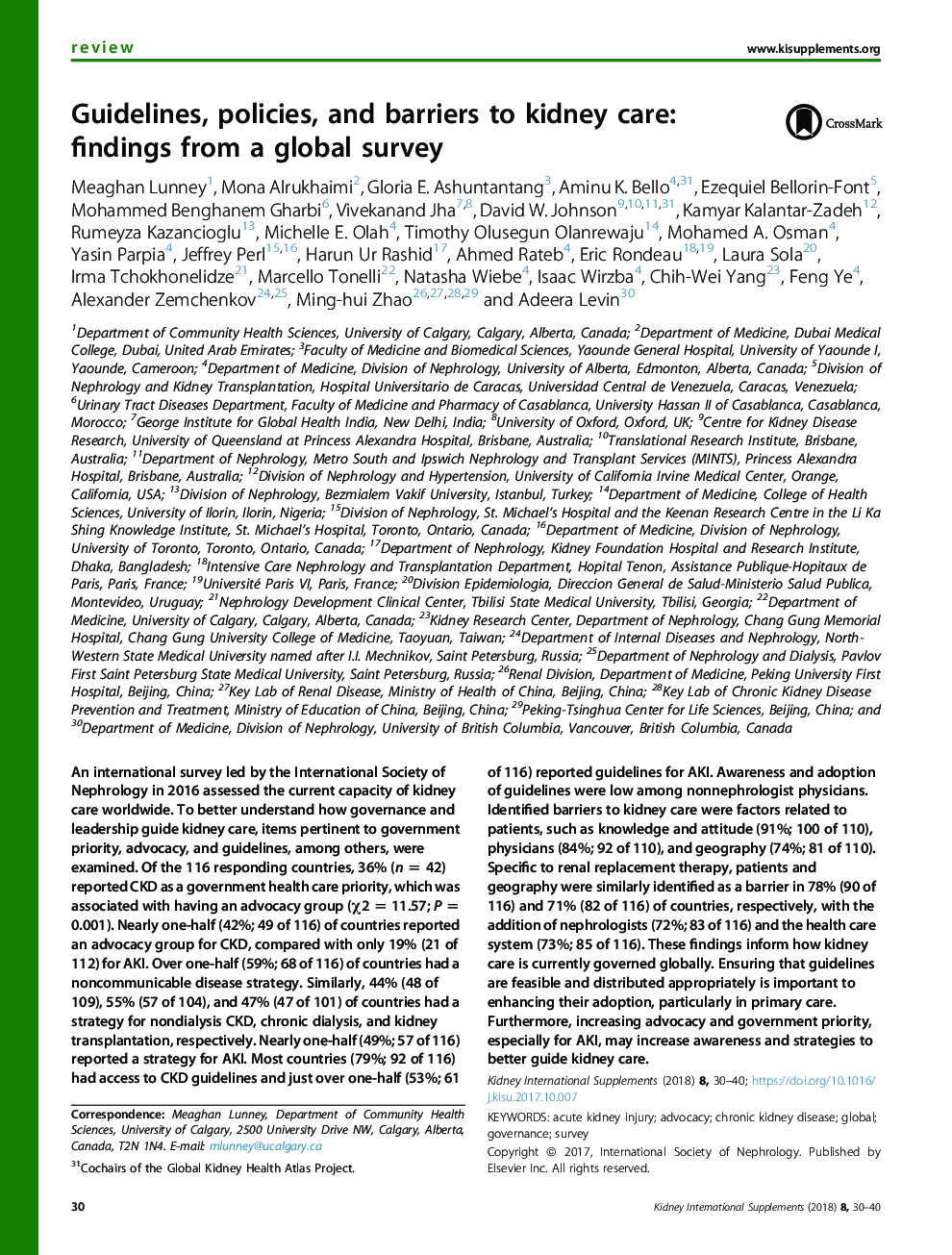| کد مقاله | کد نشریه | سال انتشار | مقاله انگلیسی | نسخه تمام متن |
|---|---|---|---|---|
| 8773930 | 1599179 | 2018 | 11 صفحه PDF | دانلود رایگان |
عنوان انگلیسی مقاله ISI
Guidelines, policies, and barriers to kidney care: findings from a global survey
ترجمه فارسی عنوان
دستورالعمل ها، سیاست ها و موانع مراقبت از کلیه: یافته های یک نظرسنجی جهانی
دانلود مقاله + سفارش ترجمه
دانلود مقاله ISI انگلیسی
رایگان برای ایرانیان
کلمات کلیدی
آسیب حاد کلیه، دفاع، طرفداری، بیماری مزمن کلیوی، جهانی، حکومت، نظر سنجی،
موضوعات مرتبط
علوم پزشکی و سلامت
پزشکی و دندانپزشکی
بیماریهای کلیوی
چکیده انگلیسی
An international survey led by the International Society of Nephrology in 2016 assessed the current capacity of kidney care worldwide. To better understand how governance and leadership guide kidney care, items pertinent to government priority, advocacy, and guidelines, among others, were examined. Of the 116 responding countries, 36% (n = 42) reported CKD as a government health care priority, which was associated with having an advocacy group (Ï2 = 11.57; P = 0.001). Nearly one-half (42%; 49 of 116) of countries reported an advocacy group for CKD, compared with only 19% (21 of 112) for AKI. Over one-half (59%; 68 of 116) of countries had a noncommunicable disease strategy. Similarly, 44% (48 of 109), 55% (57 of 104), and 47% (47 of 101) of countries had a strategy for nondialysis CKD, chronic dialysis, and kidney transplantation, respectively. Nearly one-half (49%; 57 of 116) reported a strategy for AKI. Most countries (79%; 92 of 116) had access to CKD guidelines and just over one-half (53%; 61 of 116) reported guidelines for AKI. Awareness and adoption of guidelines were low among nonnephrologist physicians. Identified barriers to kidney care were factors related to patients, such as knowledge and attitude (91%; 100 of 110), physicians (84%; 92 of 110), and geography (74%; 81 of 110). Specific to renal replacement therapy, patients and geography were similarly identified as a barrier in 78% (90 of 116) and 71% (82 of 116) of countries, respectively, with the addition of nephrologists (72%; 83 of 116) and the health care system (73%; 85 of 116). These findings inform how kidney care is currently governed globally. Ensuring that guidelines are feasible and distributed appropriately is important to enhancing their adoption, particularly in primary care. Furthermore, increasing advocacy and government priority, especially for AKI, may increase awareness and strategies to better guide kidney care.
ناشر
Database: Elsevier - ScienceDirect (ساینس دایرکت)
Journal: Kidney International Supplements - Volume 8, Issue 2, February 2018, Pages 30-40
Journal: Kidney International Supplements - Volume 8, Issue 2, February 2018, Pages 30-40
نویسندگان
Meaghan Lunney, Mona Alrukhaimi, Gloria E. Ashuntantang, Aminu K. Bello, Ezequiel Bellorin-Font, Mohammed Benghanem Gharbi, Vivekanand Jha, David W. Johnson, Kamyar Kalantar-Zadeh, Rumeyza Kazancioglu, Michelle E. Olah, Timothy Olusegun Olanrewaju,
